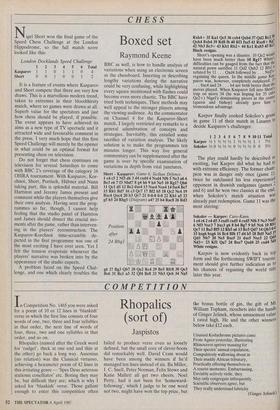CHESS
Boxed set
Raymond Keene
Nigel Short won the final game of the Speed Chess Challenge at the London Hippodrome, so the full match score looked like this: London Docklands Speed Challenge
1 2 3 4 5 6 Total Kasparov 1 1 0 1 1 0 4 Short 0 0 1 0 0 1 2
It is a feature of events where Kasparov and Short compete that there are very few draws. This is a marvellous modern trend, taken to extremes in their bloodthirsty match, where no games were drawn at all. Superb value for the spectators and just how chess should be played, if possible. The event appears to have achieved its aims as a new type of TV spectacle and it attracted wide and favourable comment in the press. I very much hope that this first Speed Challenge will merely be the opener in what could be an optimal format for presenting chess on television.
Do not forget that chess continues on television for several Saturdays to come with BBC 2's coverage of the category 16 OHRA tournament. With Kasparov, Kor- chnoi, Short, Portisch, Hiibner and Nunn taking part, this is splendid material. Bill Hartston and Jeremy James present and comment while the players themselves give their own analysis. Having seen the prog- rammes so far, though, I cannot help feeling that the studio panel of Hartston and James should dissect the crucial mo- ments after the game, rather than interven- ing in the players' reconstruction. The Kasparov-Korchnoi time-scramble de- picted in the first programme was one of the most exciting I have ever seen. Yet I felt the tension evaporate whenever the players' narrative was broken into by the appearance of the studio experts.
A problem faced on the Speed Chal- lenge, and one which clearly troubles the BBC as well, is how to handle analysis of variations when using an electronic screen as the chessboard. Inserting or describing lengthy variations during the narrative could be very confusing, while highlighting every square mentioned with flashes could become even more chaotic. The BBC have tried both techniques. Their methods may well appeal to the stronger players among the viewing audience. As the commentator on Channel 4 for the Kasparov-Short match, I largely restricted my remarks to a general adumbration of concepts and strategies. Inevitably, this entailed some sacrifice of variation analysis. The likely solution is to make the programmes ten minutes longer. This way live general commentary can be supplemented after the game is over by specific examination of variations in depth from vital junctures.
Short - Kasparov: Game 6; Sicilian Defence. 1 e4 c5 2 Nf3 d6 3 d4 cxd4 4 Nxd4 Nf6 5 Nc3 a6 6 Be3 e6 7 f3 Nbd7 8 g4 h6 9 h4 Ne5 10 Rgl? Qb6 11 Qcl d5 12 Bet dxe4 13 Nxe4 Nxe4 14 fxe4 Be7 15 Rhl Bd7 16 c3 Qc7 17 Bf2 b5 18 Qc2 Nc4 19 Bxc4 Qxc4 20 b3 Qc7 21 0-0-0 0-0 22 Kbl a5 23
g5 h5 24 Rhgl (Diagram) a4? 25 b4 RacS 26 Rd3 Position after 24 Rhgl
g6 27 Bg3 Qb7 28 Qe2 Rc4 29 Be5 Rfc8 30 Qe3 Bch 31 Rel a3 32 Qf4 Be8 33 Nb3 Qc6 34 Na5
Rxb4+ 35 Kal Qc5 36 cxb4 Qxb4 37Qd2 Rc21 Qxb4 Bxb4 39 Rd8 f6 40 Rn fxe5 41 RxeS+ _ 42 Nb3 Bc3+ 43 Kbl Rb2+ 44 Kcl Rxb3 45 Ku' Black resigns. Short's opening was a disaster. 10 Qe2 would have been much better than 10 Rgl? White's difficulties can be gauged from the fact that the natural pawn sacrifice 11 Qd2 Qxb2 12 Rbl refuted by 11 . . . Qxd4 followed by . . . Nxf3+ regaining the queen. In the middle game Kasn' parov was, however, completely. outplayed. 17 . . . bxc4 and 24 . . . b4 are both better than the moves played. When Kasparov fell into Shall trap on move 34 (he was hoping for 35 cxb4 Qc2+) Nigel's dominating pieces in the centre (queen and bishop) already gave him 8 tremendous advantage.
Karpov finally cooked Sokolov's goose in game 11 of their match in Linares to decide Kasparov's challenger.
1 2 3 4 5 6 7 8 9 10 11 Total ICarpov 1/2 1'
sh 1/2 1
1' 1/2 1 1 7' Sokolov % 0 % 1/2 % 0 1/2 % % 0 0 31/2
The play could hardly be dekribed es exciting, but Karpov did what he had to with extreme efficiency. The former chant' pion was in danger only once (game 1), twice he outclassed his less experienced opponent in drawish endgames (games 2 and 6) and he won two classics at the end, when Sokolov's match situation Was already past redemption. Game 11 was the most stirring:
Sokolov — Karpov: Caro-Kann.
1 e4 c6 2 c4 d5 3 exd5 cxd5 4 cxd5 Nf6 5 Nc3 NO, 6 NB Nxc3 7 Inc.3 g6 8 h4 Bg7 9 h5 Nc6 10 RIP Qc7 11 Ba3 Bf5 12 Rb5 a6 13 Rc5 Qd7 14 Qb3 the 15 hxg6 hxg6 16 Bc4 Bf6 17 d4 b5 18 Bd5 Na5 17, Qdl Nb7 20 Ne5 BxeS 21 dxe5 NxcS 22 Qt, Nd3+ 23 Kfl Qa7 24 Bxe7 Qxd4 25 cxd4 NI" White resigns.
Karpov is now evidently back in top form and the forthcoming SWIFT tourne- ment should give further indication as to his chances of regaining the world title later this year.


























































 Previous page
Previous page